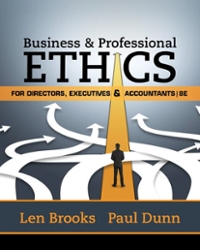Martin Pilzmaker was a young, aggressive lawyer from Montreal who was invited in 1985 to join the
Question:
Martin Pilzmaker was a young, aggressive lawyer from Montreal who was invited in 1985 to join the law firm Lang Michener in Toronto. It was expected that his immigration law practice “could enrich the (firm’s)
coffers by \($1\) million a year catering to the needs of Hong Kong Chinese already starting to panic over the crown colony’s 1997 return to China’s control.”
Although rumors of Pilzmaker’s questionable practices began to surface and were reported to the firm’s executive committee in December, it was not until early February 1986 that a senior colleague, Tom Douglas, “drew aside Ament and Wiseman
(Pilzmaker’s junior colleagues) and grilled them on their boss’s activities. They told him that Pilzmaker not only smuggled regularly but that he was running a doublepassport operation.... The scam involved the false reporting of lost Hong Kong passports by his clients, which, in fact, would be kept by Pilzmaker in Canada. On their replacement passports, the clients could travel in and out of the country at will.
When the time came to apply for citizenship—which requires three years’
residence—they could supply the original
‘lost’ passports to show few if any absences from Canada.”
Douglas told the executive committee of this activity, by memo, on February 10. The executive committee “speculated that Pilzmaker’s admissions may have constituted only knowledge of wrongdoing on the part of certain clients and not active complicity.
The committee decided to send
(two members) Don Wright and Donald Plumley back to Pilzmaker to ask him, in the words of Farquharson’s instructing memo, ‘if he would be willing to agree’
not to participate in any client violation of the Immigration Act.”
Early in June 1986, angered that Pilzmaker had not been expelled, Tom Douglas sought advice from Burke Doran, “a colleague he regarded as a personal friend but moreover, one who was a bencher, or governor, of the Law Society. Doran went on to advise him to keep his head down and his mouth shut—a caution Doran later said he had no recollection of giving.”
While mulling over this advice and some from another lawyer, Brendon O’Brien, a foremost authority on professional conduct, Douglas discovered a further problem. “This was a proposal by Pilzmaker to Brian McIntomny, a young associate lawyer, who was in the market to buy a house. The idea was that McIntomny would put up \($50,000\) for a \($200,000\) house, the balance supplied by a Pilzmaker client in Hong Kong. The client would officially own the house, have the phone and utilities registered in his name, while McIntomny lived in it and held a secret deed. After three years, he would pay the client the interest-free \($150,000\), register the deed to place title in his own name and benefit from the accrued increase in value.
The client, meanwhile, would have ‘proof’
of having resided in Canada for the three years required for citizenship.” Douglas arranged for Bruce McDonald, a member of the firm’s new executive committee, now consisting of McDonald, Don Wright, Albert Gnat, Donald Plumley, and Bruce McKenna, to be informed........
Questions:-
1. Are professionals bound to meet a higher standard of ethical behavior than nonprofessionals? If so, why?
2. In what respects were the actions of the lawyers involved in the Lang Michener affair not up to the ethical standard you would expect? Consider
a. Pilzmaker’s conduct;
b. the conduct of members of the executive committee at Lang Michener—in particular, Burke Doran; and
c. the investigation and proceedings by the Law Society.
What obligations did each owe to clients, the legal profession, the Law Society, and the public?
3. Do the same considerations apply to other professionals as to lawyers?
4. Is the self-regulation of a profession on ethical matters effective from the perspective of
a. the members of the profession?
b. the public?
c. clients?
5. Would you agree with the argument, which was used to exonerate members of the management team, that “when a professional makes a serious mistake, the error is of no consequence, if it is honestly made”? (Bud Jorgensen, The Globe and Mail, February 5, 1990, B9).
Step by Step Answer:

Business And Professional Ethics
ISBN: 9781337514460
8th Edition
Authors: Leonard J Brooks, Paul Dunn





